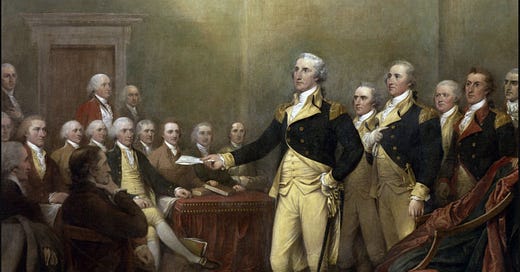The United States of America is a nation founded on the principle of civilian control of the military. This principle is enshrined in the Constitution, which gives Congress the power to declare war, raise and support armies, and provide for a navy. The President is the Commander-in-Chief of the armed forces, but he or she is subject to the authority of Congress.
The principle of civilian control of the military is essential to the preservation of our democratic Republic. It prevents the military from becoming too powerful and from using its power to overthrow the government. In addition, civilian control ensures that the military is used to achieve national goals, not the personal ambitions of individual military leaders.
One of the most famous examples of civilian control of the military occurred at the end of the American Revolution. General George Washington, who had led the Continental Army to victory against the British, voluntarily resigned his commission and returned it to Congress. This act was a powerful symbol of the American commitment to civilian control of the military.
In contrast to Washington's example, General Mark Milley, the current Chairman of the Joint Chiefs of Staff, clearly violated the principle of civilian control of the military. According to a recent book by Bob Woodward and Robert Costa, Milley told his Chinese counterpart, General Li Zuocheng, that he would call him if the President of the United States decided to attack China. This promise was made without the knowledge or approval of the President.
Milley's actions are deeply troubling. They suggest that he is willing to put his own personal judgment ahead of the President's orders. This is a dangerous precedent to set. If military leaders are allowed to disobey the President's orders, it could lead to a breakdown in the chain of command and even civil war.
The principle of civilian control of the military is essential to the preservation of our Republic. It is important to remember that the military is a tool of the government, not the other way around. Military leaders must be subordinate to civilian authority.
It is important we Americans reaffirm the principle of civilian control of the military. This can be done by taking the following steps:
The President must hold military leaders accountable for their actions. If a military leader disobeys the President's orders, they should be fired and investigated for violations of the Uniformed Code of Military Justice.
We professional military officers, active and retired, must hold senior officers that violate this principle publicly accountable by speaking out loudly and often against their illegal actions.
The public should be educated about the importance of civilian control of the military. This will help to build support for this principle and make it more difficult for military leaders to violate it.





The U.S. Constitution takes priority over everything. Civilian Control of the Military is OK as long as the Civilian Control does not Violate the U.S. Constitution. Every Officer in the U.S. Military takes an Oath to defend and protect the U.S. Constitution. Every member of the U.S. Government takes an Oath to defend and protect the U.S. Constitution. Officers in the U.S. Military would not take an Oath to defend the U.S. Constitution, if they did not have the power to defend the U.S. Constitution..
That is where Civilian Control of the Military ceases. If the U.S. Government violates the U.S. Constitution, the U.S. Military is required by the U.S. Constitution, to defend the U.S. Constitution.
If a member of the U.S. Government is guilty of Treason, as defined in the U.S. Constitution, the U.S. Military has the responsibility and has the power to arrest them, and conduct a U.S. Military Court Marshal to determine their guilt or innocence. When a member of the U.S. government has committed Treason against the United States, it is the responsibility of the U.S. Military to defend the U.S. Constitution, and arrest them, so it is not accurate to state that Civilians have complete control over the U.S. Military. Civilians have control over the U.S. Military as long as the Civilians are not violating the U.S. Constitution. We are a nation of states under the U.S. Constitution. The U.S. Constitution defines our nation, and is the ultimate power in our nation.